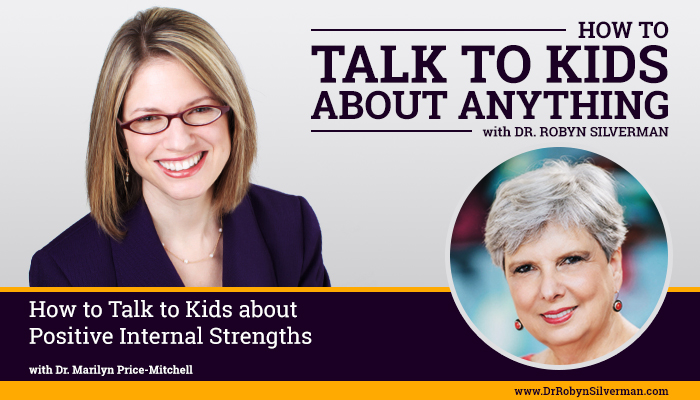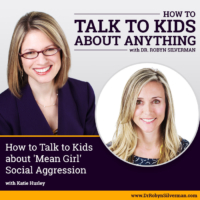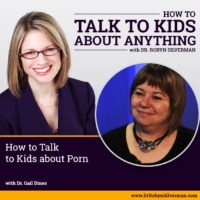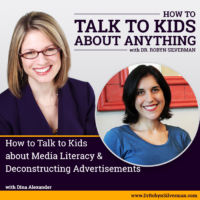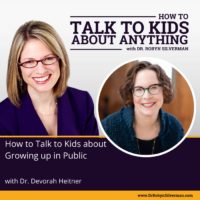Podcast: Play in new window | Download
Subscribe: Apple Podcasts | RSS | More
How to Talk to Kids about Positive Internal Strengths
This podcast will focus on the core abilities that help kids thrive. Instead of focusing on external motivators like grades and punishments- we talk about the internal compass that children can refer to when making choices. By focusing on curiosity, creativity, integrity, resourcefulness and the like, children can rely on their own values to know what to do. We need to cultivate character in our kids. In this podcast, we focus on how to do this with Dr. Marilyn Price Mitchell.
So most of you probably know that I’ve been writing the Powerful Words Programs for after-school programs and schools for over 15 years now—a program that focuses on one powerful character word a month with scripts and tips and a full curriculum to teach and encourage children to become a strong citizen of their household, their school, their community and the world. I’m writing a book about it right now, based on this podcast and I’m developing Family Action Blueprints on it so that you can do this at home (more on that is coming!). Personal development and character education important to me and I know it’s important to all 65,000 of you who have been downloading this podcast over the last year. So I get very excited when I meet other people who share my viewpoint about the need to shift our attention from academic success to one that focuses on positive youth development and personal growth.
While the terminology of “family values” might conjure up heated arguments we’ve heard on the political trails for years, it doesn’t need to be that way. It’s important to determine what our family values are in order to provide a foundation to our children (and ourselves) for how to live life. These values become our grounding force and decision-makers when we are wondering what to do in challenging situations and questionable circumstances. They become the voice in our heads, the songs in our hearts and the governing energy inside our bodies. They truly are important. So how do we figure out what are family values are and how to convey them? I’m so thrilled to have my colleague, Dr. Marilyn Price Mitchell on the show today so we can have a good conversation about all of this together.
Dr. Marilyn Price-Mitchell is a developmental psychologist, speaker, and fellow at the Institute for Social Innovation 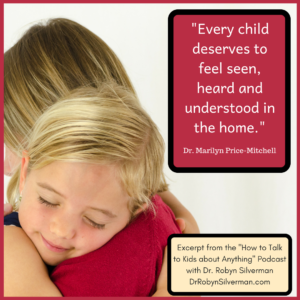 at Fielding Graduate University where she studies how young people become caring family members, innovative workers, ethical leaders, and engaged citizens in an increasingly complex society. She is founder of Roots of Action, a website that shares research-based resources on positive youth development with parents, schools, and communities – with an audience of over half-million readers each year. She is the author of Tomorrow’s Change Makers: Reclaiming the Power of Citizenship for a New Generation and a contributing writer at Psychology Today and Edutopia.
at Fielding Graduate University where she studies how young people become caring family members, innovative workers, ethical leaders, and engaged citizens in an increasingly complex society. She is founder of Roots of Action, a website that shares research-based resources on positive youth development with parents, schools, and communities – with an audience of over half-million readers each year. She is the author of Tomorrow’s Change Makers: Reclaiming the Power of Citizenship for a New Generation and a contributing writer at Psychology Today and Edutopia.
The podcast provides:
- How 8 core abilities (the compass advantage) can help guide kids to make positive choices in life.
- A discussion of parenting mindset and the parenting promise
- How media and books can help identify core abilities and become a springboard for discussion
Important Messages:
- The core abilities are: Curiosity, Sociobility, Resilience, Self awareness, integrity, resourcefulness, creativity and empathy- these are the abilities that help kids thrive.
- Ground tough issues using the compass advantage-use the core values and strengths as guiding principals.
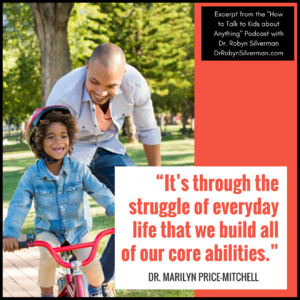 Use books and movies to discuss what happened, the protagonist, what the characters needed to overcome. Look at the values, character and higher purpose. What resonates?
Use books and movies to discuss what happened, the protagonist, what the characters needed to overcome. Look at the values, character and higher purpose. What resonates?- Ask your children; “what did that feel like?” (somatic reactions) This can help them become more self aware.
- Alter praise to link it with character. This resonates to the core of who we are.
- Tell stories of when you went through a tough time
- By the time kids are in third grade, much of curiosity has been extinguished. The sense of discovery has been extinguished. They become just interested in grades and not in learning.
- We want to shift from the external to the internal- to nurture curiosity. Nurture the questions.
- If you get an instant answer, you don’t need to be curious anymore. Ask deeper and deeper questions about the world around them.
- See who your children are through these 8 abilities. Parents get to know their children best.
- Show kids that we are not perfect.
- Many kids don’t know who they are separate from the grades they are given.
- Allow your child to live the life of their choosing and do it with grace and curiosity and integrity. It’s our jobs as parents to help this to happen.
Notable Quotables:
- “When young people develop a combination of 8 core abilities throughout their lives, they can help them to thrive in whatever endeavors they choose.”
- “Many parents stray away from tackling tough issues that their kids are witnessing everyday but I believe we need to tackle these issues with our kids.”
- “Use the media to help our kids to become more self aware and resourceful. What can we gain and learn from books and movies that help us to become a better family? To work on goals together? To be creative? All of these abilities are wrapped up in heroes and heroines of stories.”
- “Help kids understand how all of these abilities– Curiosity, Sociability, Resilience, Self awareness, integrity, resourcefulness, creativity and empathy- live inside themselves through many different channels.”
- “All of these abilities get nurtured through our relationship with our children. As parents, we’re our children’s greatest allies. It’s about standing at their side—not doing their learning for them.”
- “Be there for your child. Help your child see a situation through a new lens.”
- “Every time we get a child to take a moment and reflect and check in with how they are feeling in their bodies, helps them become more self aware.”
- “This is a world filled with challenges. It’s not about solving all of the challenges. It’s about helping our child become the person they want to become in the face of these challenges.”
- “Give your children the feedback that you feel and understand what they’ve been through and how you admire the resilience that they have shown. That’s real praise.”
- “It’s through the struggle of everyday life that we build all of our core abilities.”
- “Curiosity is about lifelong learning. If we don’t nurture curiosity in kids, then they won’t become life long learners. Is it just about getting our kids about high school or is it about encouraging our kids to be lifelong learners?”
- “In the process of focusing on grades, kids lose their sense of discovery that they were born with. When they lack that curiosity, many kids enter middle and high school totally uninterested in learning and only interested in grades.”
- “Creativity and curiosity leads to innovation.”
- “It’s really important for parents to make sure that their children feel seen, heard and understood in the home.”
- “One thing we fail at as a society to recognized is that our imperfections and our failures and the opportunity we have to be vulnerable with each other is really an opportunity to cultivate wisdom.”
- “Kids know we aren’t perfect. They see our imperfections so why isn’t it okay for our children to now be perfect?”
- “All kids have these 8 core abilities regardless of the grades they get in school.”
- “Grades matter. But in the process, grades take so much from our children in allowing them to learn who they really are separate from a grade.”
Resources:
- RootsofAction.Com
- Parenting Promise: https://www.rootsofaction.com/wp-content/uploads/2016/02/Parenting-Promise-2-Web.pdf
- I have a dream resource: https://www.rootsofaction.com/wp-content/uploads/2016/02/I-Have-a-Dream-2-Web.pdf

